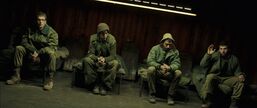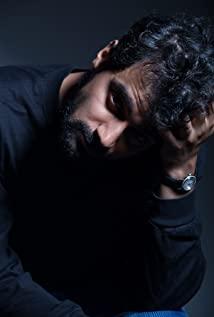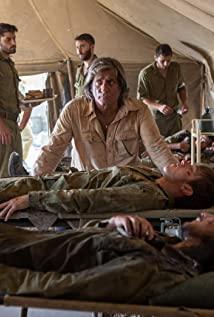When ancient Greek tragedies involve fatalistic stories, prophecies are often thrown out first. The more people try to take measures to break the prophecy, the closer they are to the ending told by the prophecy. Sometimes I often think that it is better that the characters in the tragedy do not know the prophecy, because once the prophecy is known, life loses the unknown, and a certain moment in the future becomes the nightmare that dominates you. News of Jonathan's death proved to be a misjudgment, and while it was gratifying, it could turn it into a prophecy in Feldman's eyes. But "Foxtrot" satirizing the war with this absurd tale of fate was only the first step.
There is a line in Good Will Hunting: "You're strong, and when it comes to war, you'll say Shakespeare's words, 'Go to war, dear friend,' but you've never been in war, never put your friend's head on his back. On his knees, watching him let out his last breath, and looking at you with help-seeking eyes." I have never experienced anything about life and death, and my cognition of certain things often stays in concepts. The reason why the truth still has a bad life. Just because we hear a bunch of truths doesn't mean we have a deep understanding of what they mean to us.
Even though Feldman participated in the war, the dead comrades were separated from him after all, so in his heart, the more luck, the more flukes, the more clearly he showed how despicable he was in his heart. Of course, the death of his comrade-in-arms made him feel somewhat guilty. A feeling of cherishing and awe of life.
This is especially reflected in the memory of his sending his son, who joined the army, to the bus station: he just regarded the time they spent together in the car as a moment in his daily life, talking on the phone and continuing his work. Ordinary parents may not be able to imagine the life of their children entering the military, but didn't Feldman know the unexpected dangers that may come when joining the military on a mission?
So, we go back to the beginning, where the film begins with the scene where Feldman's wife faints immediately upon hearing the news of her son's death. Contrasted with his wife's violent reaction, which is logically normal, Feldman's first expression was a kind of confusion, as if he were puzzled that death had entered the house. Successfully becoming an architect and living an ordinary and prosperous life made Feldman gradually think that he was far from death, but is this really the case?
There is an interesting detail in the movie: Mrs. Feldman scratches the needle-pricked part of her thigh in a coma, and rubs off the band-aid, which Feldman puts back with great care. The gesture implicitly corresponds to how Feldman's war wounds were carefully buried by himself, while Jonathan's death in a camel crash was like his wife's scratching her thigh, inadvertently exposing the wound.
Jonathan's actual death comes at the end like all tragedies, but the character isn't just a bearer of fate or a victim of war. Feldman said that his wife's pregnancy with Jonathan was an apocalypse for him, but it was not so much God's forgiveness for him as it was to remind him that behind the birth of a new life, there are countless lives that have passed away, reminding him to re-understand life. and the question of life and death.
Just like the director himself became really aware of fate and death because of his daughter's survival, and conveyed these thoughts in the form of movies. But apparently, Feldman's postwar life seemed to be immersed in silent self-pity, not only his wife knew, but his two children. Jonathan knew his father was mad at his grandma because of the porn exchange, but when his comrades asked him, he chose to keep the secret.
Combined with the later paintings, we can see that at this age, his understanding of his father is rare. But in the face of the manslaughter incident, Jonathan's reaction has a shadow of Feldman that we have not seen. Moreover, Jonathan's choice is essentially the same as his father's, taking a silent approach to misfortune and death. If he hadn't died, this matter might have also become a secret of his life, tormenting him. This also shows that the true reincarnation of fate is not the death that falls on the son, but that the two also quit the army in a humiliating way.
The only luck is that the death of his son gave Feldman the opportunity to confess the shadow in his heart, but Jonathan could only keep the facts in the painting in the end. Ironically, in the eyes of Feldman and his wife, who did not know the facts, Bulldozer The pictures of high-lift cars can only be associated with marital problems and husband-wife relationships.
Thus, we see that the tragic climax of ancient Greece set at the end has long since been exhausted in a series. Is it fate that the foxtrot keeps repeating itself back and forth? Sometimes it may just be the dancer's choice, as the director believes that many of the repeated mistakes in history are avoidable.
In this film, the fault lies in the thinking behind Feldman's move to send his son home: If he can use his connections to get his son home, someone has to go to the border in his stead. Just as he was confirmed misjudged premised on the death of the other, the life was not saved to continue, but rather survived by the replacement. It's not just the country that thinks so, Feldman, as a former soldier and current father, doesn't think so.
The cross that has been pasted on Feldman's face since his youth tells us that apart from shame and guilt, he has not changed anything, and this is the greatest punishment for him. The only gratification is that in the end, even if he and his wife were divorced, they could touch each other's wounds and move forward instead of standing still.
View more about Foxtrot reviews











